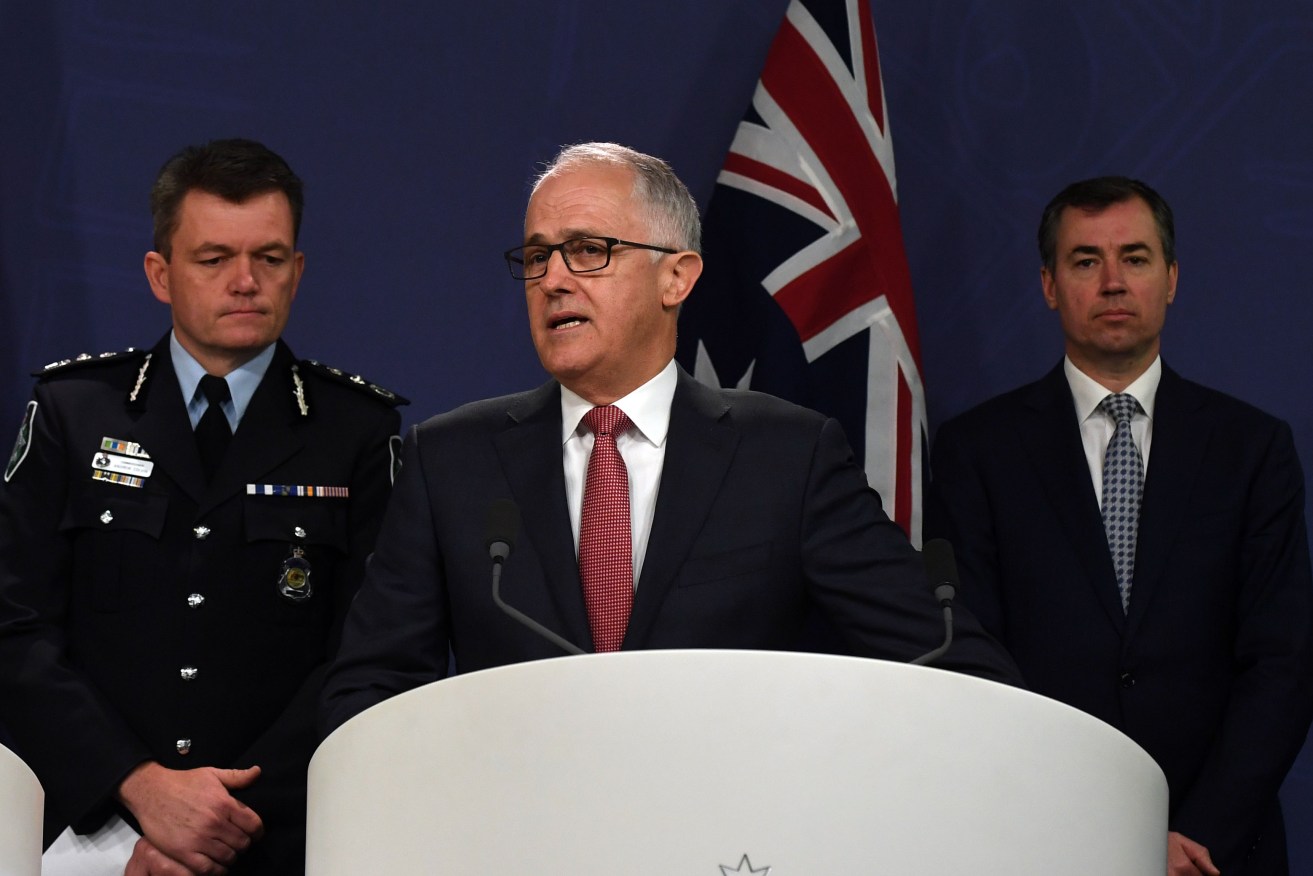Terror plot: Two hours the “new normal” for airport check-in
A two-hour check-in time for domestic travellers in Australia will become the new normal, after authorities in Sydney foiled a suspected terror plot to bring down a plane with a bomb.

Prime Minister Malcolm Turnbull alongside AFP Commissioner Andrew Colvin (left) and Minister for Justice Michael Keenan (right) on Sunday. Photo: AAP/Sam Mooy
Jetstar and Virgin Australia have upgraded their advice from one hour, also telling passengers to limit carry-on and checked baggage to ensure efficient screening processes.
International travellers should arrive three hours before their fight departure time.
NSW and federal police swooped on five properties in the Sydney suburbs of Surry Hills, Lakemba, Wiley Park and Punchbowl and arrested four men on Saturday afternoon.
They are in custody and will be held there for up to seven days as police comb through the evidence.
The extra check-in time is needed because of “additional scrutiny” and security experts say the arrangements will likely be in place for the foreseeable future.
A magistrate ruled yesterday that the four men arrested for their alleged role in the terrorist conspiracy can be detained for up to a week while investigators comb through evidence.
The men, arrested by the NSW Joint Counter Terrorism Team on the weekend, are in custody pending ongoing inquiries, the Australian Federal Police said in a statement on Sunday night.
A magistrate has ruled police can hold the men for an “additional period of detention” under the Crimes Act while investigations continue.
“This recognises that terrorism investigations are inherently complex and that there can be legitimate reasons for extended periods of detention for suspects in such matters,” the AFP statement said.
The men were arrested as NSW and AFP Police officers swooped on five properties in the Sydney suburbs of Surry Hills, Lakemba, Wiley Park and Punchbowl on Saturday afternoon.
Prime Minister Malcolm Turnbull said airport security measures had been increased and reassured the public of their safety.
“The tight co-operation and collaboration between our intelligence and security agencies is the key to keeping Australians safe from terrorism,” he said.
A number of “items of interest” were seized and searches at four of the properties continued on Sunday, with AFP Commissioner Andrew Colvin suggesting they may take “many more days”.
The plan involved an improvised device and was Islamist-inspired, he added.
“We’ve taken this threat very seriously,” Colvin said.
“You should infer that we think this was credible and there was an intention, and there was quite possibly a capability as well.”
Colvin expressed confidence Australia’s airport security protocols would have prevented the plans coming to fruition.
Despite this, travellers were warned to expect delays and increased scrutiny at all Australian departure points after security measures were “intensified”.
“Some of that will be visible, some of it will not be visible, but it will take more time,” Turnbull said.
The plot was the 13th significant conspiracy to be foiled by Australian authorities since the country’s terror threat level was raised to “probable” in 2014.
Dr John Coyne, who heads the Australian Strategic Policy Institute’s Border Security Program, called it the most “troubling”.
“It involves a much more co-ordinated group, on face value,” he told AAP.
“They had that level of planning and they obviously had some expectation of achieving success, which indicates they’d identified a vulnerability themselves.”
Colvin said he had no reason to believe the integrity of airport security had been compromised.
Coyne agreed current provisions would have thwarted the plot had it gained momentum. He said since the September 11 attacks in 2001, terror incidents had shifted to regionally-focused incidents – such as the Bali bombings – and then to a domestic lone-wolf trend.
“One data point doesn’t make a pattern, but we’re seeing a new chapter arising or a return chapter almost,” he said.
“This is much more planned and deliberate, if the allegations are correct.”
Justice Minister Michael Keenan said 70 people had been charged as a result of 31 terror operations since 2014.
State and federal police agreed Saturday afternoon was the right time to act based on risk assessments, NSW Police Commissioner Mick Fuller said.
“The reality is with terrorism, you can’t wait until you put the whole puzzle together,” he said.
“You have to go early because if you get it wrong, the consequences are severe.”
No details have been released about the arrested men, who are yet to be charged.
– AAP




